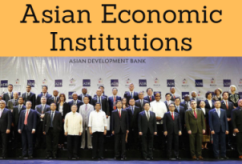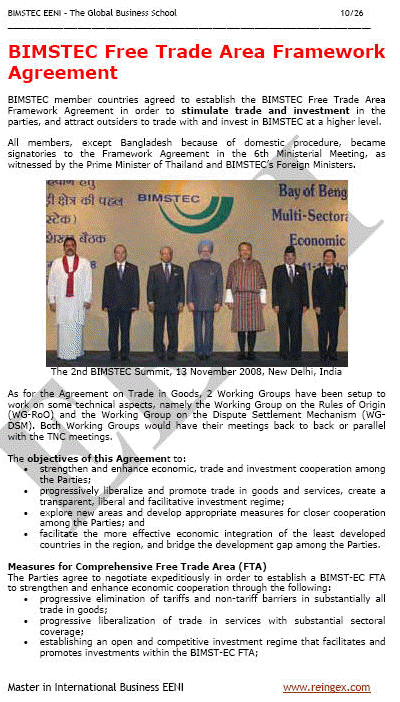Bay of Bengal Initiative (BIMSTEC)
Free Trade Area Bay of Bengal: Bangladesh, India, Sri Lanka, Thailand

Today, the Bay of Bengal Initiative (BIMSTEC) comprises seven members: Bangladesh, India, Myanmar, Sri Lanka, Thailand, Bhutan, and Nepal.
The main objective of the Bay of Bengal Initiative is to promote multi-sectoral cooperation for economic and social progress of the Bay of Bengal region.
- Introduction to the Bay of Bengal Initiative for Multi-Sectoral Technical and Economic Cooperation (BIMSTEC)
- Economic Profile of the member countries of the BIMSTEC: Bangladesh, India, Myanmar, Sri Lanka, Thailand, Bhutan, and Nepal
- Objectives of the Bay of Bengal Initiative
- Free Trade Area of the Bay of Bengal
- BIMSTEC Framework Agreement
- International Trade and Foreign Direct Investment in the Bay of Bengal Initiative region
Bay of Bengal Initiative (BIMSTEC):


The objectives of the subject “Bay of Bengal Initiative (BIMSTEC)” are:
- To understand the objectives of the Bay of Bengal Initiative for Multi-Sectoral Technical and Economic Cooperation (BIMSTEC)
- To evaluate the benefits for the BIMSTEC member countries
- To research the economic integration process (Free Trade Area) and Foreign Trade among the Bay of Bengal Initiative member countries

The Subject “Bay of Bengal Initiative (BIMSTEC)” is included within the curriculum of the following academic programs at EENI Global Business School:
Masters: International Business, Foreign Trade.


Course: Hinduism and Business.
Languages:  or
or  Iniciativa Bahía Bengala
Iniciativa Bahía Bengala  Initiative de la baie du Bengale (BIMSTEC)
Initiative de la baie du Bengale (BIMSTEC)  Iniciativa da Baía de Bengala.
Iniciativa da Baía de Bengala.

In 1997 was founded BIST-EC (Bangladesh, Bharat (India), Sri Lanka, and Thailand Economic Cooperation).
- In 1997, Myanmar joined BISTEC as a full member; the name was changed to the Bay of Bengal Initiative (BIMST-EC)
- In 1998, Nepal was granted as observer status
- In 2004, Nepal acceded to the Bay of Bengal Initiative as a full member
- Full membership grant to Bhutan in 2003
The Bay of Bengal Initiative provides a sole link between the Association of Southeast Asian Nations (ASEAN) and SAARC bringing together 1.3 billion people (21% of the world's population), a combined GDP of USD 750 billion and a total trade volume of 59 billion dollars under the Bay of Bengal Initiative Free Trade Area scheme.
Substantial progress has made in negotiations on the Free Trade Agreement on trade in products.
The Bay of Bengal Initiative (BIMSTEC) member countries (Bangladesh, India, Myanmar, Sri Lanka, Thailand, Bhutan, and Nepal) agreed to create the Free Trade Area Framework Agreement in order to promote Foreign Trade, FDI, and to attract to foreign enterprises to do business and invest in the Bay of Bengal region.
The objectives of the Free Trade Area Framework Agreement of the Bay of Bengal Initiative (BIMSTEC) are to:
- Strengthen and improve economic, International Trade, and Foreign Direct Investment cooperation
- Progressively liberalize and promote Foreign Trade in Products and services
- Create a transparent, liberal and facilitative investment regime
- Research new areas and develop the appropriate measures for a deep cooperation
- Facilitate the economic integration of Least Developed countries in the Bay of Bengal region
- Reduce the development gap among the members
With the view to speeding up the regional Trade in Services growth, the Bay of Bengal Initiative members agrees to enter into negotiations to liberalize the Trade in Services.
Economic cooperation areas of the Bay of Bengal Initiative (BIMSTEC).
- Mutual recognition agreements, conformity assessment, accreditation procedures, and standards and technical regulations
- Customs cooperation
- International finance
- E-commerce; and
- Business visa and travel Facilitation
The Bay of Bengal Initiative (BIMSTEC) belongs to:
- Hindu Economic Area
- Central Eurasian Economic Area (Islamic Civilization)
- Buddhist Economic Area
Economic Corridors related to the Bay of Bengal Initiative region
(c) EENI Global Business School (1995-2025)
Top of this page









 WhatsApp
WhatsApp